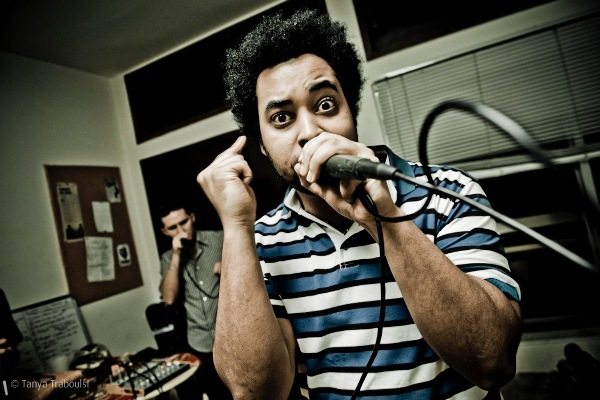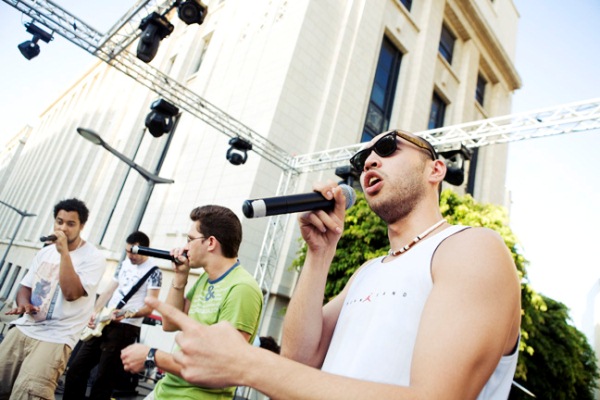Fareeq el Atrash
Modern time poetry

Poetry is not just written pieces with a certain numbers of syllables following a strict scheme. It can also be about making yourself heard in other ways, whether about love, politics, the environment or working class struggle. Hip-hop is this kind of poetry.
Fareeq el Atrash is one of many on the Lebanese hip-hop scene, but what sets them apart from others is the fact that they are a live band. Their lyrics are mixed with groovy and funky bass lines, and they take on issues as diverse as love, war, social and political matters, racism, dreams, corruption or stereotypes about hip-hop.
Current members are Edouard ‘Edd’ Abbas and Nasser ‘Chyno’ Shorbaji as The Emcees, Fayez ‘FZ’ Zouheiry is the beat-boxer and John ‘L’Bass’ Nasr as the Bass Player. Fareeq el Atrash include extra session musicians in their live Performances, such as Fouad Afra on the Drums, Raffi Mandalian on electric guitar and Arthur Sathyan on the Keys and Synth. Mashallah News had the chance to meet Edd to talk about the band and its relation to poetry.
How did it all start?
Before us, John had a collective band called Fareeq el Atrash. They were friends who used to jam together, until some of them traveled and others went separate ways. I met John early 2006, whom he continued to produce beats, so we started working on a project. In the meantime, FZ and I went to the same university, after hearing him beat-boxing in one of the classrooms, I asked him to join us in the process. The project took us almost a year to finish and another year trying to put it out on the shelf. It was released in the “pre-album launch party” at basement and ended up online for free to download after the launch of our official Fareeq el Atrash album with the current formation through forward music. Nasser also joined after. We were in the same play with director Nidal Ashkar. In other words, we are used to working with each other on stage.

We’ve been working on our set list since 2008, when Nasser and I started writing new songs with the ‘modern’ Fareeq el Atrash, if I dare say. We signed our first deal with Forward Music in January 2010. The album was released at La fête de la Musique at the Roman Baths in Downtown Beirut on June 21, 2010.
Do you see yourself as being the new type of Arab poets, with just a different style of saying things?
Yes. Hip hop is modern time poetry. Before, there was classical poetry like zajal, which had rules, basics and the certain type of flow it had to follow. The beauty of the old was the rules. With the evolution of time, poetry didn’t become easier, but it came closer to people and got more straightforward. The wording now is simpler, using the spoken language rather than the written one. Also, even though there are different dialects in the region, Arab emcees, as well as the public, can relate to each other because of the common causes and problems we face.
What do you think of when you hear the word poetry?
I think about 7keeleh. Journalist and photographer Simba Russeau created “Taste Culture” in 2009. This was made to fight racism and to encourage the mix and understanding of the African, European and Arab cultures. We both launched 7keeleh, which is part of Taste Culture. It is a poetry night with different genres, let it be classical poetry, rap or experimental music. Most of the poets who come are rappers. The participants are those who had something to say. At the end of each evening, there is an open mic, in which any member of the audience who feels like reading poetry can do so.

How do you see the future for Fareeq el Atrash?
Things are going pretty well for us these days. We are offered several opportunities to increase our exposure, not only on the local scene but also in the Arab world and internationally. For example, we had the chance to participate in the program Arabs Got Talent last month, which was a great way advertise our music. We performed songs that truly represent us, without thinking about censorship or wondering whether it would bother some people or not. This is usually how we work. Our second piece criticised the rusted and corrupted regimes of the region. We believe in never refusing anything or any opportunity. You never know what’s behind that door. In addition to that, our fans are our priority. We do the music because we love it, but also to keep pleasing and never disappointing them.
After 7keeleh, I created Sha3beh, event to expose emcees, DJs, VJs and new local talents. I know that it’s very hard to break through here, with the grip that media outlets and clubs have on music. The hip hop scene is very small in Lebanon and there are pure young talents. We hear mainstream songs everywhere whereas underground music is not getting the publicity it deserves. Radio and TV stations are still afraid of it. But this music is the only one that truly criticises what is wrong, says what is happening and points out the truth. This is why Sha3beh is organised every month, with the fourth event only yesterday at t-marbouta in Hamra. I aim at pushing the hip hop scene.

How do you think that your message makes people think?
On each topic, everyone has a different perspective. So each song on any given theme might teach people a new angle. Emcees and us in Fareeq el Atrash deal with diverse topics: sometimes by going into details and sometimes keeping it general. We talk about personal things to explain emotions we might be going through, as well as more abstract issues like dreams. The real artist shows his character through his music and lyrics. I believe that songs can be powerful and change someone’s point of view and opinion. They can trigger something strong.
How do you see the future of Arabic hip-hop?
The Arab hip-hop scene has been very active, especially those past 2 years. Artists are working more because they see that people are evolving, and there are more and better ways of communication. It’s much simpler to reach out to other people now, with the internet, YouTube and Facebook. Also, recording equipment is more accessible and less expensive. This means that we can record draft versions at home and know how to improve. But, until the issue of mainstream media’s single-minded focus is resolved, there will always be this barrier keeping hip-hop from evolving the way it deserves.
لوين
علم واحد أرزة خضرة بوسط المدينة عشنا بمبادئ وحدة بإيدي مجمرة الثانية رماد لأهلها
متل انتخابات ولاد ما بدنا بالليل اجتمعنا الليل جمعنا
وتدور وتدور وقت الجلوس لا تدوم سكوت وقت الغروب تزول
قبل ما نعرف كيف حننسى بدنا الحقيقة تبقى بالساحة تبقى ذكرى
مين هالساحر ورا هل القدرة بهالجرأة يطلع بهيك فكرة وبيبقى مجهول
حبل الكذب لا يطول مقصور، عنا يتحاكم مطلوب ممنوع يواجه يعنى يشوف النور ممنوع
هيك القانون فوق الواحد وعشرين
حطو مسؤول/بلا شهادة صاحب البيت مشغول برد عليك المولود بتفكر حالك إقبلوك
لإنو كنت موعود بالآخر بتطلع مفقوس
كلو من ورا بدو صوت حنون ابتسامة، شعر طويل والباقي مبروم
كل مالها بتطول نزول بالشارع منموت الجوع بتسافر تتروح تشوف فرص عمل على المكشوف يلي قبلك راحو و صاروا ملوك
ملوك رؤوس أموال أصحاب روس
روس شريب كأس، على أساس
هني الكل ونحنا يلي بلا أحساس
هني الكل ونحنا يلي بلا احساس
chorus
لوين بعدك رايح كأنو منّك شايف إدامك
الدنيا متل حقل ألغام عقبالك
قاعدين عم نحلل ألغاز كلامك
انتبه على كل شي بينقال بيناتنا
ما يروح و يتسرب بالأدغال
أعدائنا ناطرين ورا الأشجار كرمالنا
وكرمال ياخذو كل الأخبار من بلادنا
بالنهاية طلع قرار ما فادنا
Verse2
لوين بعدك رايح كأنو منَك شايف, فتحو جبهات ع بلادك و متل ما شايف, البعض عمل صف تاني, قال اتخذ قرار عشوائي, والله وجودكن متل إلتو, ناشف
طلعت الصرخة الكل, دار الديني الطرشى, عمل حالو مش داري بعوروبتنا, بلاد العرب صار بدَا تعريب عن جديد, وقت الجد طلع في أكتر عملى لإسرائيل
لسوء الحظ كان بدنا نحرِر الجنوب, صار بدنا نحرِر لبنان قبل ما ينفو ينهو
العمليِة تخطِة اللحدود, حطُونا رسمال مقابل تنين جنود
عم بينشال ضحايا بالكياس من ورا كل صاروخ, الغول تيَس بدو يلحس المبرد تيدوب, إذ مش ليوم بوكرا بتوب, قانا واحد , قانا تنين, أنا شفت التالتي بكابوس
منَا بعيدة عن الخيال بس انشاء الله تكون السابتي
تركو,تركو للبنان المجروح أو جبولو تابوت تيرتاح متل واحد مخنوء مشلول عالعصب مكموش فلتو
منرفض انسلمو للعدو متل ما هو أو هوِ, ما رح نعملَك فحص دم لانشوف لمين بتصوِة ,أو أي طيَار مفوِت بحكي بإسم الأخوِي, تحت شعار , وطن موحَد بقولو, إه بقوِي
Ba3ed min hon khalini balesh/
Mashi ma3i timshaye bas sha3el el daw la2ni mush shayef/
Kil el emcees, fa fillo 3alsaree3/
Ibel ma titda3wesu mitlel mishaye… w’frakh mitelkon, /
b’titakaloo bala tidshaye/ Cappuchyno ahwe murra
mush kibeyet shai, bala sukkar wa mush taye2 shi/
w’mitl ibret ‘horon’ wa2et el takreez b’hak hek/
hat el microphone khalini shak shek/
mawad muhalwase, tarkeebe mrakaze/
bitseer bitwal wel, b’tifsel mitl el munassef/
ana min hal mel, 3asabi mnarfass/
w’ma fini jaless illa iza mkhadar/
hader nafsak li hal darrar/
3am faker keef haddem jismek wa2et el akl/
la2nno l’yabba wahsh w’shakhs mitmaken/
hata lama buktob el alam b’sakin/
bidak tmashkel ana ma 3andi mishkle/
ka2nak mashi bil qutb wa labess nus kim/
intel mujrem, inta mush hip hop/
iza album’kom byinsame3 fa Bush byinta2/
kalimat brakibon 3al “boov”, “dij”, “tah”/
ana t2eel 3al masrah fal ‘beat’, byinta3ej/
(Chours)
Ba3ed min hon, B-B-Ba3ed min hon/
B-B-Ba3ed min hon, B-B-Ba3ed min hon/
Repeat
Pictures by Tanya Traboulsi and Karen Kalou.
4 thoughts on “Fareeq el Atrash”
Comments are closed.







Fareeq al Atrash are the best! Cool interview. And nice with to put them in the context of classical writing. Arabic poetry is the shit!
I have been listening to Fareeq Al Atrash’s music for 2 1/2 years now and it seems to be getting better and better, even when you think it cant get any better. Cant wait to go back to Lebanon to see these guys play live. Last time I had to board a plane as they played a gig. PS.. I listen to them from far away Australia and all my friends love there tunes.. Great interview
Great Interview Edd. Fareeq El Atrash deserve all the accolades they’ve been getting lately. Congrats Brothers.